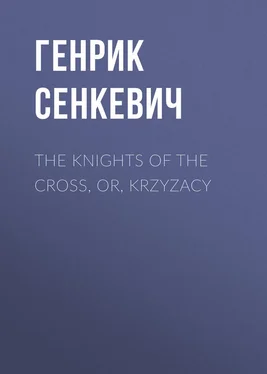Генрик Сенкевич - The Knights of the Cross, or, Krzyzacy
Здесь есть возможность читать онлайн «Генрик Сенкевич - The Knights of the Cross, or, Krzyzacy» — ознакомительный отрывок электронной книги совершенно бесплатно, а после прочтения отрывка купить полную версию. В некоторых случаях можно слушать аудио, скачать через торрент в формате fb2 и присутствует краткое содержание. Жанр: foreign_antique, foreign_prose, на английском языке. Описание произведения, (предисловие) а так же отзывы посетителей доступны на портале библиотеки ЛибКат.
- Название:The Knights of the Cross, or, Krzyzacy
- Автор:
- Жанр:
- Год:неизвестен
- ISBN:нет данных
- Рейтинг книги:4 / 5. Голосов: 1
-
Избранное:Добавить в избранное
- Отзывы:
-
Ваша оценка:
- 80
- 1
- 2
- 3
- 4
- 5
The Knights of the Cross, or, Krzyzacy: краткое содержание, описание и аннотация
Предлагаем к чтению аннотацию, описание, краткое содержание или предисловие (зависит от того, что написал сам автор книги «The Knights of the Cross, or, Krzyzacy»). Если вы не нашли необходимую информацию о книге — напишите в комментариях, мы постараемся отыскать её.
The Knights of the Cross, or, Krzyzacy — читать онлайн ознакомительный отрывок
Ниже представлен текст книги, разбитый по страницам. Система сохранения места последней прочитанной страницы, позволяет с удобством читать онлайн бесплатно книгу «The Knights of the Cross, or, Krzyzacy», без необходимости каждый раз заново искать на чём Вы остановились. Поставьте закладку, и сможете в любой момент перейти на страницу, на которой закончили чтение.
Интервал:
Закладка:
"It is right for you both to eat from one dish; but do not step on her feet under the table, nor touch her with your knees, as the other knights do to their ladies, because she is too young."
To this he answered:
"I shall not do it, gracious lady, for two or three years yet, until the Lord Jesus permits me to accomplish my vow, and then this little berry will be ripe; as for stepping on her feet, even if I would like to do it I can not, because they do not touch the floor."
"True," answered the princess; "but it is pleasant to see that you have good manners."
Then there was silence because everybody was busy eating. Zbyszko picked the best pieces of sausage, which he handed to Danusia or put directly into her mouth; she was glad that such a famous knight served her.
After they had emptied the dishes, the servants of the monastery began to pour out the sweet-smelling wine – abundantly for the men, but not much for the ladies. Zbyszko's gallantry was particularly shown when they brought in the nuts which had been sent from the monastery. There were hazel nuts and some very rare nuts imported from afar, called Italians; they all feasted so willingly, that after awhile there was heard no sound in the whole room but the cracking of shells, crushed between the jaws. But Zbyszko did not think only about himself; he preferred to show to the princess and Danusia his knightly strength and abstinence. Therefore he did not put the nuts between his jaws, as the others did, but he crushed them between his fingers, and handed to Danusia the kernels picked from the shells. He even invented for her an amusement; after having picked out the kernel, he placed his hand near his mouth and, with his powerful blowing, he blew the shells to the ceiling. Danusia laughed so much, that the princess fearing that the young girl would choke, was obliged to ask him to stop the amusement; but perceiving how merry the girl was, she asked her:
"Well, Danusia, is it good to have your own knight?"
"Oj! Very!" answered the girl.
And then she touched Zbyszko's white silk " jaka " with her pink finger, and asked:
"And will he be mine to-morrow?"
"To-morrow, and Sunday, and until death," answered Zbyszko.
Supper lasted a long time, because after the nuts, sweet cakes with raisins were served. Some of the courtiers wished to dance; others wished to listen to the rybalts or to Danusia's singing; but she was tired, and having with great confidence put her little head on the knight's shoulder, she fell asleep.
"Does she sleep?" asked the princess. "There you have your 'lady.'"
"She is dearer to me while she sleeps than the others are while they dance," answered Zbyszko, sitting motionless so as not to awaken the girl.
But she was awakened neither by the rybalts ' music nor by the singing. Some of the courtiers stamped, others rattled the dishes in time to the music; but the greater the noise, the better she slept.
She awoke only when the roosters, beginning to crow, and the church bell to ring, the company all rushed from the benches, shouting:
"To matins! To matins!"
"Let us go on foot for God's glory," said the princess.
She took the awakened Danusia by the hand and went out first, followed by the whole court.
The night was beginning to whiten. In the east one could see a light glare, green at the top, then pink below, and under all a golden red, which extended while one looked at it. It seemed as though the moon was retreating before that glare. The light grew pinker and brighter. Moist with dew, the rested and joyous world was awakening.
"God has given us fair weather, but there will be great heat," said the courtiers.
"No matter," answered the Pan of Dlugolas; "we will sleep in the abbey, and will reach Krakow toward evening."
"Sure of a feast."
"There is a feast every day now, and after the confinement and tournaments, there will be still greater ones."
"We shall see how Danusia's brave knight will acquit himself."
"Ej! They are of oak, those fellows! Did you hear what they said about that fight for four knights on each side?"
"Perhaps they will join our court; they are consulting with each other now."
In fact, they were talking earnestly with each other; old Macko was not very much pleased with what had happened; therefore while walking in the rear of the retinue, he said to his nephew:
"In truth, you don't need it. In some way I will reach the king and it may be he will give us something. I would be very glad to get to some castle or grodek [20] – Well we shall see. We will redeem Bogdaniec from our pledge anyhow, because we must hold that which our forefathers held. But how can we get some peasants to work? The land is worth nothing without peasants. Therefore listen to what I am going to tell you: if you make vows or not to anyone you please, still you must go with the Pan of Mielsztyn to Prince Witold against the Tartars. If they proclaim the expedition by the sound of trumpets before the queen's confinement, then do not wait either for the lying-in, or for the tournaments; only go, because there will be found some profit. Prince Witold is munificent, as you know; and he knows you. If you acquit yourself well, he will reward you liberally. Above all, if God help you, you will secure many slaves. The Tartars swarm in the world. In case of victory, every knight will capture three-score of them."
At this, Macko being covetous for land and serfs, began to fancy:
"If I could only catch fifty peasants and settle them in Bogdaniec! One would be able to clear up quite a piece of forest. You know that nowhere can you get as many as there."
But Zbyszko began to twist his head.
"Owa! I will bring hostlers from the stables living on horse carrion and not accustomed to working on the land! What use will they be in Bogdaniec? Then I vowed to capture three German crests. Where will I find them among the Tartars?"
"You made a vow because you were stupid; but your vow is not worth anything."
"But my honor of wlodyka and knight? What about that?"
"How was it with Ryngalla?"
"Ryngalla poisoned the prince, and the hermit gave me absolution."
"Then in Tyniec, the abbot will absolve you from this vow also. The abbot is greater than a hermit."
"I don't want absolution!"
Macko stopped and asked with evident anger:
"Then how will it be?"
"Go to Witold yourself, because I shall not go."
"You knave! And who will bow to the king? Don't you pity my bones?"
"Even if a tree should fall on your bones, it would not crush them; and even if I pity you, I will not go to Witold."
"What will you do then? Will you turn rybalt or falconer at the Mazowiecki court?"
"It's not a bad thing to be a falconer. But if you would rather grumble than to listen to me, then grumble."
"Where will you go? Don't you care for Bogdaniec? Will you plow with your nails without peasants?"
"Not true! You calculated cleverly about the Tartars! You have forgotten what the Rusini[21] told us, that it is difficult to catch any prisoners among the Tartars, because you cannot reach a Tartar on the steppes. On what will I chase them? On those heavy stallions that we captured from the Germans? Do you see? And what booty can I take? Scabby sheep-skin coats but nothing else! How rich then I shall return to Bogdaniec! Then they will call me comes !"
Macko was silent because there was a great deal of truth in Zbyszko's words; but after a while he said:
"But Prince Witold will reward you."
"Bah, you know; to one he gives too much, to another nothing."
"Then tell me, where will you go?"
"To Jurand of Spychow."
Macko angrily twisted the belt of his leather jacket, and said:
"May you become a blind man!"
Читать дальшеИнтервал:
Закладка:
Похожие книги на «The Knights of the Cross, or, Krzyzacy»
Представляем Вашему вниманию похожие книги на «The Knights of the Cross, or, Krzyzacy» списком для выбора. Мы отобрали схожую по названию и смыслу литературу в надежде предоставить читателям больше вариантов отыскать новые, интересные, ещё непрочитанные произведения.
Обсуждение, отзывы о книге «The Knights of the Cross, or, Krzyzacy» и просто собственные мнения читателей. Оставьте ваши комментарии, напишите, что Вы думаете о произведении, его смысле или главных героях. Укажите что конкретно понравилось, а что нет, и почему Вы так считаете.












